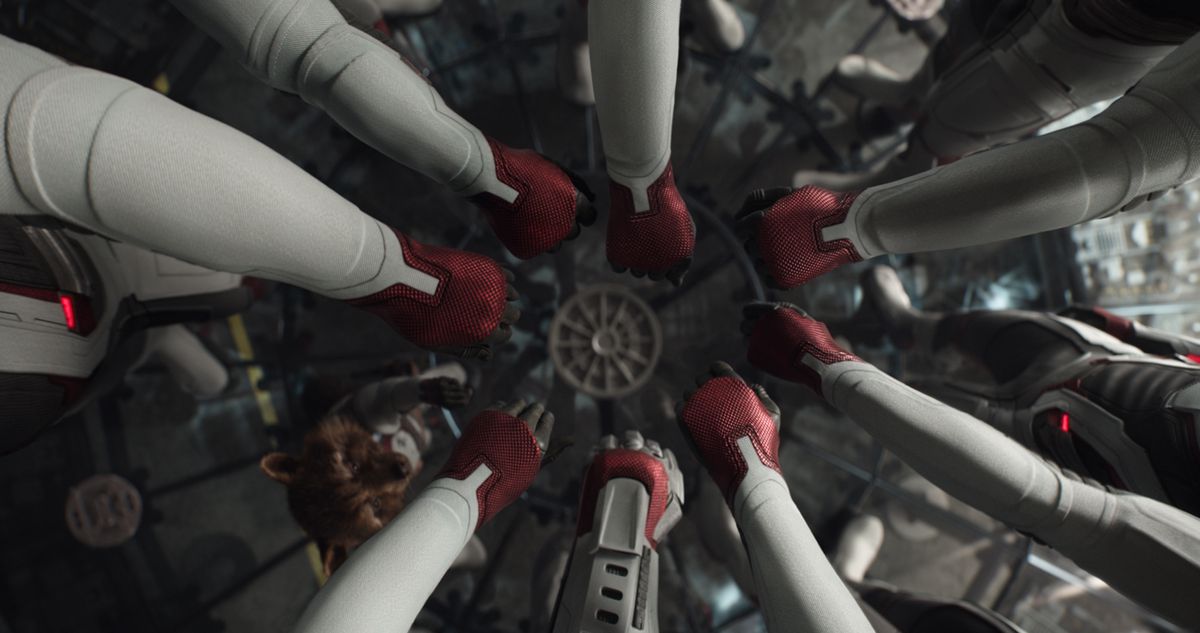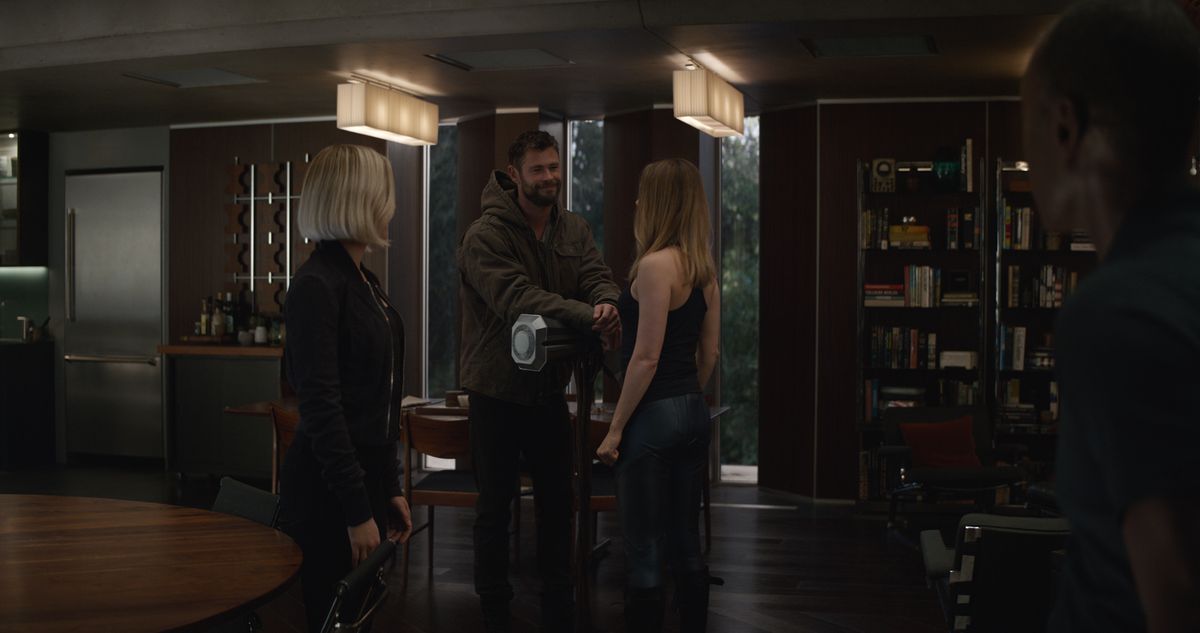Spoiler alert: This essay includes no specific single plot points from Avengers: Endgame, but does mention some broad plot ideas that could be considered significant spoilers.
At three hours long, Avengers: Endgame is a lot of movie, which means it has a lot of room for the things fans love about the Marvel Cinematic Universe — as well as the things some critics find frustrating about it. Sometimes, it’s both thrilling and frustrating at the same time — especially when it’s a movie dealing with time travel.
Part of the movie’s long, winding story involves the core Avengers (who survived the apocalyptic population-halving “snap” at the end of Avengers: Infinity War) circling back to crucial moments in MCU history. Over the course of 22 films, the MCU has become increasingly insular, complicated, and self-involved. The story that began in 2008 with Iron Man, which was at least vaguely grounded in real-world concerns about arms trafficking and global politics, is now principally concerned with splitting up and recombining its impressive roster of characters. For every Black Panther, a movie based in real-world racism and resonance, there’s an Infinity War that feels like a fan convention. Endgame doubles down on that vibe by blatantly playing back some of the MCU’s greatest hits, for action and humor purposes.

Endgame’s use of time travel is a definitive case of self-referentialism, but it’s also a wonderfully comic book-y conceit, and it allows for satisfying riffs on past MCU sequences — both famous and not. As good time-travel stories tend to do, it hits some poignant notes about the scarcity of time and the bittersweet nature of nostalgia. And those notes apply to the MCU itself, in a metatextual way, as well. There have been so many Marvel superhero adventures over the past 11 years, but there haven’t been that many actual Avengers movies. There was the groundbreaking smash-hit original; a less broadly loved, but wildly ambitious and underrated sequel; and the Infinity War / Endgame duology, which isn’t exactly one movie split in two, but doesn’t exactly feel like a pair of separate films, either.
Part of this has to do with Infinity War, which has “Avengers” in its title, but doesn’t have much to do with any of the iterations of the team from the two previous Avengers movies, or the de facto Avengers side-quel Captain America: Civil War. Its gargantuan crossover event folds in the Guardians of the Galaxy, previously lurking bad guy Thanos, and the Black Panther ensemble, among others. These aren’t just new or alternate Avengers. Infinity War and Endgame both count basically the entire universe as Avengers.
A lot of fans love Infinity War, but it’s a cluttered movie without a lot of breathing room. (The pace, after all, is breathless.) Endgame, on the other hand, takes a deep breath at the outset, rejoining its characters slowly. There’s more reflection, stronger acting from the talented ensemble, and more memorable shot compositions than directors Joe and Anthony Russo usually manage. Amid the downbeat aftermath of the snap, there’s also the pleasure of watching the movie reassemble the original Avengers: Iron Man, Captain America, Thor, the Hulk, Black Widow, and Hawkeye, with a manageable handful of newer recruits like Ant-Man, Nebula, and Captain Marvel. The pared-down ensemble has more screen time, and less superpowered flexing. Even when the movie starts getting nuttier, with its time travel and magical stones, it’s less action-packed and more character-driven than its predecessor.

It’s all a reminder of how adaptable and varied these characters can be — but the reminder comes just as Marvel is winding many of them down. Part of Endgame’s bittersweetness derives from the fact that, regardless of how the series continues (and most of these characters likely will be seen again, some of them very soon), the Avengers from 2012 probably aren’t getting back together any time soon. Some of this melancholy is the natural byproduct of how great these actors are at playing these lovable characters. Some of it is effective filmmaking, though the Russos are also prone to milking emotions without really crystallizing them in concise images.
And some of the melancholy derives from the MCU’s series-wide tendency to rush past its best moments in pursuit of grand, crowd-pleasing crossover events. Those crossovers sometimes deemphasize what these movies do best. While the cinematic house style of the Marvel movies can become rote, Endgame shows how much life there is left in these characters’ relationships. The movie gets a lot of mileage out of, say, the Hulk trying to comfort a drunken, desolate Thor, or Black Widow forlornly looking over her peanut butter sandwich as Captain America watches.
These scenes might sound silly or manipulative on paper, but they’re more engaging than many of the MCU’s digital action sequences. Massive fights like the ones in Endgame’s back half have gotten more frequent these last few years, as the core Marvel characters have been thrown around from event to event. Changes to the status quo are made (S.H.I.E.L.D. is Hydra, the Avengers break up), undone (Tony Stark un-retires, Captain America returns to the grid), and hastily made again (half the heroes are dusted) in service of a bigger master plot. It would have been entertaining and novel to keep some extra company with the Avengers in the space between the big changes and the triumphant reunion — to see an Avengers sequel or two with more shawarma sit-downs, more casual house parties, more Thor / Hulk heart-to-hearts, and more peanut butter sandwiches. Less obsession over the Infinity Stones, and more characters. More world-saving, but less universe-dominating.

Imagine a rejiggered Phase Three of the MCU that took more time to let these characters breathe the way Endgame’s best moments do. Maybe Captain America: Civil War could have been reconceived as the Avengers sequel it kind of was already, leaving room for a separate Captain America movie following him on a smaller-scale adventure closer to, say, James Mangold’s The Wolverine. Infinity War could have been freed from the Avengers moniker, and focused more intently on Thanos — a villain-as-protagonist gambit that the filmmakers claimed to have performed, but ultimately hedged on. And Endgame could still function as an Avengers reunion / finale.
Obviously, what the MCU did instead was no mistake. Box-office records have been smashed. Fans are delighted; shareholders are delighted. It’s just hard to shake the feeling that some of Endgame’s predecessors existed primarily to goose anticipation for this latest astronomically grossing MCU event. (It’s an effective strategy for getting people to fill in their personal MCU blanks — in particular, Endgame cleverly makes Thor: The Dark World feel more essential than it ever was before.) Some fans claim that any lack of connectivity is the problem with, say, Age of Ultron, as compared to the newer Avengers movies: it isn’t smooth or assured enough in moving along the series’ master plot. Others will claim to have been waiting 11 years for Endgame.
But why? There were 20 other MCU movies between Iron Man and Endgame, and there was room enough for more material that explored these characters’ human sides rather than focusing on Infinity Stone collection, and serving as a temporary holding area for characters before routing them to a massive showdown.
In some ways, Kevin Feige’s dynamic of always teasing the next project is true to life. Many of us do, in fact, live our lives in anticipation of some promised excitement in the future. Given the MCU’s status as a self-perpetuating forever franchise, it’s admirable that Marvel is willing to draw its stories to a close — at least for some characters. But the MCU’s strength has rarely been in endings. The original Avengers’ rapturous finale is the exception, not the rule. These films’ gargantuan action sequences get all their flavor from the meaningful moments between them.
And that idea is wonderfully literalized during Endgame’s time travel scenes. Amid some major action moments from the movies’ past, the characters create smaller, more satisfying grace notes for their new movie. That should come across as self-regarding, but it doesn’t. If anything, it feels like Marvel didn’t entirely realize what it had until it was almost gone, and took the opportunity to improve on its own past. Endgame is a strong outing for the Avengers, but it also highlights how much more time and space we needed with these characters.
https://www.theverge.com/2019/4/29/18522726/avengers-endgame-characters-movies-captain-america-iron-man-black-widow-hulk-thor

